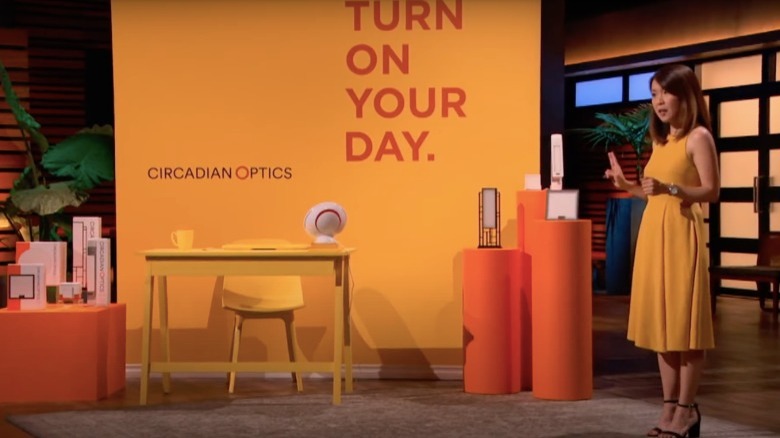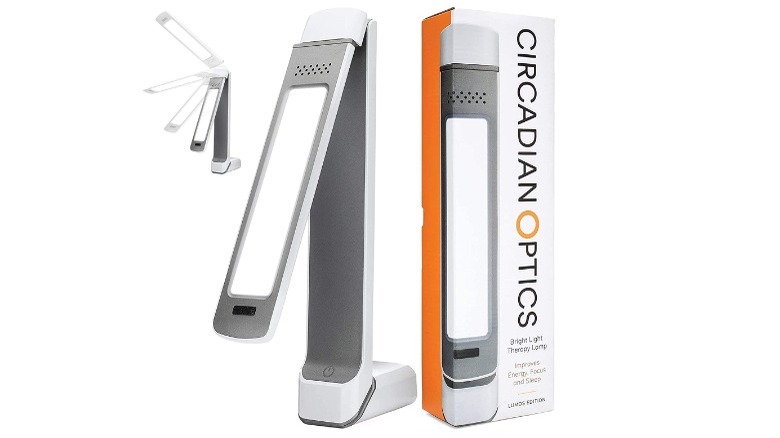What Happened To Circadian Optics After Shark Tank?
We may receive a commission on purchases made from links.
"Shark Tank," the long-running TV show where entrepreneurs pitch their businesses to a line-up of tough but super-rich investors, has launched several products that have gone on to achieve mainstream success — just look at Bombas, Scrub Daddy, and the Squatty Potty for proof. However, other inventions that appeared on "Shark Tank" went on to receive less attention after their air date. Circadian Optics is one such example.
As founder Amber Leong shared with Mashable SE Asia, Circadian Optics began in 2016 after Leong, a Malaysian native, struggled to adjust to the dark winters in Minnesota. She bought a light therapy lamp to help her cope, but she wasn't satisfied with the way it looked and how much space it took up on her desk. "I thought to myself, there has to be a way to make good-looking light therapy lamps...so I did," she explained.
Circadian Optics launched its own sleek and stylish lamps designed to mimic sunshine, even on gloomy days. Leong pitched the products on a Season 11 episode of "Shark Tank," claiming at the time that Circadian Optics was already a $5 million company. Her story of immigrating to the U.S. and leaving her family behind — even facing a life-threatening illness at one point — brought the Sharks to tears. But what really happened after the cameras stopped rolling?
Circadian Optics wowed investors on Shark Tank
During her 2019 appearance on "Shark Tank," Amber Leong detailed how she wanted to continue scaling Circadian Optics up and eventually sell the products in retail stores (back then, they were only available online). Her request on the show: An investment of $750,000 in exchange for a 10% stake in the company.
Leong's heart-tugging personal journey was a key part of what made Circadian Optics such a hit with the Sharks, and by the end of her pitch, she secured a handshake deal from Mark Cuban and Lori Greiner to receive a total of $750,000, plus an extra $50,000 to be given to her parents, who helped Leong immigrate to the U.S.
Soon after her episode aired, the Circadian Optics owner told CNBC Make It that she was still discussing the deal with Greiner and Cuban: "We're in communication, and we're working on it. I am so thankful and so excited for the future, you wouldn't believe it."
The company has evolved but is still in business
Circadian Optics continues to sell light therapy lamps online and has apparently landed in retail stores including Walmart too — just as Amber Leong dreamed would happen. The brand also has a page on Amazon showcasing four different lamp styles available in different colors. Its most popular product, the Lumos 2.0 Light Therapy Lamp, boasts over 6,000 ratings, averaging 4.6 out of 5 stars.
While Circadian Optics continues to shine (no pun intended), it's unclear how much of a role "Shark Tank" played in its success. Some reports suggest the on-air deal never came to fruition, which isn't uncommon — a survey by Forbes revealed that 73% of business owners failed to secure the exact deal they were offered in front of the cameras. Circadian Optics has also gone through some changes since winning over the Sharks in 2019.
For one, the company's original website now redirects to Amazon, and its Instagram and Facebook accounts haven't been updated since January 2021. Leong also appears to no longer be involved with the company as of December 2021, per her LinkedIn profile. As noted in a PR Newswire news release, Circadian Optics now belongs to Thrasio, a company specializing in the acquisition of Amazon businesses.


